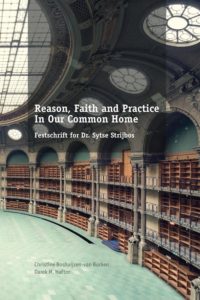Celebration of Sytse Strijbos’ Academic Achievements ~ Festschrift for Dr. Sytse Strijbos
No comments yet This remark is in honour of Professor Emeritus Sytse Strijbos. His work for the Centre for Philosophy, Technology and Social Systems (CPTS), which later evolved into the International Institute for Development and Ethics (IIDE) has been highly important for me as a PhD student, and later, for my professional career and guidance of own PhD students. The common denomination in our work relates to our interest in Systems Thinking and Herman Dooyeweerd’s philosophy.
This remark is in honour of Professor Emeritus Sytse Strijbos. His work for the Centre for Philosophy, Technology and Social Systems (CPTS), which later evolved into the International Institute for Development and Ethics (IIDE) has been highly important for me as a PhD student, and later, for my professional career and guidance of own PhD students. The common denomination in our work relates to our interest in Systems Thinking and Herman Dooyeweerd’s philosophy.
We met the first time more than 20 years ago, at the Free University of Amsterdam where Sytse had organized a one-day seminar. This was the beginning to our annual conferences, which included researchers and PhD students from Sweden, The Netherlands, UK, and later, South Africa. The conferences were held at Sytse’s home town in Maarssden, at an old house which used to be a convent. We conveniently stayed in the same building as where the conferences were held and the nuns, who now had moved to a newer convent, provided full time lodging for us. The surroundings of this venue were beautiful and inspirational for many interesting conversations.
In preparation for each conference, the participants shared their draft papers before hand so that others could reflect on the content and prepare comments and questions. The presentations were given lengthy time to allow for comprehensive reviews. After each presentation, when Sytse’s lead the discussion, he divided into: first, Questions/Comments for clarification; second, Questions/Comments for critique. This division was very helpful for me as a student. If it was a question for clarification, I needed to be more clear in my explanation; if it was a question for critique, I needed to reflect on my standpoint and provide better arguments (or abandon). What was also very helpful, a few days after each presentation and discussion, each presenter had to reflect on what was brought about and give feedback on what they intended to act on. In that way, the others got recognition of what had been influential for further development of the work and how they might have contributed to this.
In addition to the conference presentations there was also invited guests who gave presentations and lectures on topical issues of our interest. By meeting such distinguished guests in this relaxed conference setting, we got very good contact and had many informal discussions which I have brought with me in my professional career.
The conferences resulted in proceedings for which we took turns on being the editors. By that and by interacting with more seniors, I also learnt about the craft of being an editor (and got an additional merit on my CV). The proceedings included our updated versions of the conference papers, complemented with comments from the editors, and, therefore, became of high quality. At first, these proceedings were only distributed by print but, eventually, also electronically.
Besides annual conferences, a second collaboration was the book “In Search of an Integrative Vision of Technology”, which was published 2006, ten years after our first meeting in Amsterdam. Sytse was one of the editors and main authors and several of us CPTS members contributed with chapters based on our own research focus with relevance to our 10 years of collaboration.
Finally, the inclusion of scholars from South African universities, on Sytse’s initiative, has meant life long relationships with some of them as well as made me and other conference delegates from our part of the world aware of the different context in which we operate and the different problems that we face. For instance, water management means one thing in The Netherlands where you need to protect against flooding, while something totally different in South Africa where there is a scarcity of water. This inclusion also made us more responsive to ethical issues, worldwide.
Additional activities, which I also wish to highlight:
– Sytse’s PhD course in Luleå, in 1996, that focused on the philosophy of technology. To me, that course was an eye opener in deterministic perspectives of how we think about technology.
– Sytse, being part of my PhD exam committee, in 1998, for my thesis “A Multi-Modal Systems Extension to Soft Systems Methodology”.
– Sytse, occasionally being guest lecturer at my current affiliation at Linnaeus University, both for master students and PhD students.
Now, the nuns have stopped organizing our conferences and the Maarssden house is sold. We are grateful to having learnt to know many scholars throughout the years and the relationships that have evolved. Although the conferences are not in place any longer, the collaboration continues with people we have learnt to know during these 20 years, and also with Sytse.
Anita Mirijamdotter
Nov. 22, 2016
For more, and additional information about CPTS, see http://www.basden.salford.ac.uk/cpts/story.html
You May Also Like
Comments
Leave a Reply




